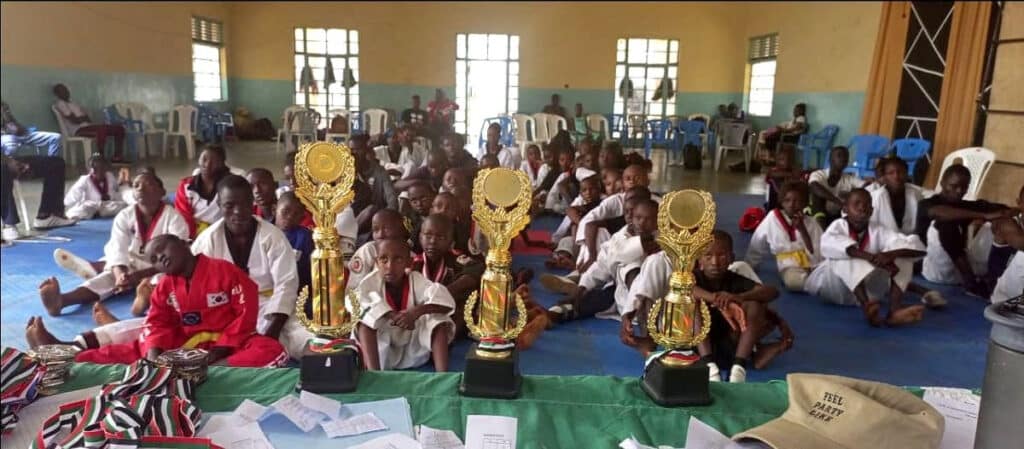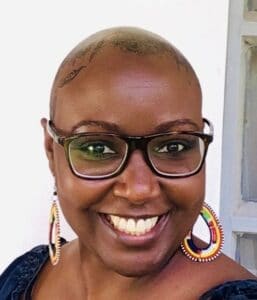Dead siblings, gangs and drugs, sewage and the hope from sports
By Kinya Kaunjuga

In the initial installment of the Black Belt Nurse series, we were introduced to Sheikh Balala, a nurse who works at the Uzima White Medical Clinic where our software, BandaGo, is utilized. Since then, I have maintained contact with Balala and gained further insights about his experiences.
Having listened to his vivid account of his daily activities, I felt compelled to provide you with a preview of what you can expect in the forthcoming episodes of the Black Belt Nurse series.
Alley gym
Balala teaches taekwondo to 100 boys and girls in an alley in the slum. He has chosen this spot because of the availability of a large security light that the school activates once darkness falls.
He utilizes the alleyway for an hour and has structured this initiative as an “after-school” program, aiming to keep the children engaged and occupied, away from the influence of gangs and crime. Balala draws from his personal experience of successfully escaping a life of gang involvement, applying the same principles to potentially save these children from gang influence.

As word spreads, parents have become increasingly interested, resulting in a surge in enrollment. Due to his background as both a nurse and a black belt, parents find solace in the fact that Balala can effectively ensure the safety and well-being of their children, even in the event of an injury.
In addition to the prerequisite of finishing their homework before departing for training, he conscientiously invests time in providing comprehensive explanations to parents. Balala ensures that they fully understand the program’s specifics and secures their consent prior to enrolling their children.
Sharing fight gear
Balala buys uniforms which the children share among themselves in a rotating manner. This arrangement is necessary due to his limited financial resources, which only allow him to acquire a certain number of uniforms.
The uniforms have gained widespread admiration within the community and among the children’s families, as they appreciate the sense of discipline and belonging associated with them.

Occasionally, the rotation schedule for the uniforms is subject to negotiation. Clever children engage in bargaining with the next person in line, striking deals to retain specific items. For instance, they may convince the next wearer to take only the pants, while keeping the shirt and belt for themselves to be worn for a few more days to prance around in the neighborhood! This resourceful approach ensures that the uniforms are utilized effectively and enjoyed by all.
Wizeck and Ngugi
I refer to them as Balala’s protegees, as they have made the conscious decision to steer clear of gangs and pursue a path of personal growth and improvement through the practice of taekwondo. In a place where trust and loyalty is everything, they have trusted Balala and he has aided them in participating in tournaments where they have astounded many by emerging victorious.
When I asked about this immense responsibility, Balala said, “Because I live by His will and not mine, I pray that God would raise the standard of my life just a little bit. I pray that He doesn’t give me too much or too little, but just as much I can manage.”

During a conversation with Wizeck, Ngugi and Balala, they recounted a remarkable journey – they endured a 4 hour and 48 minute ride in the back of a truck – traveling from their slum in the city to a distant town. Their determination was unwavering as they sought to attend a training camp conducted by a renowned Kenyan taekwondo grand master from Japan.
Although they knew they could not afford the seminar fee, once they arrived their plan was to request permission to sit near the wall and observe the maneuvers they aspired to learn. How this and other stories unfolded will be in our upcoming newsletters.
You can empower frontline teams with technology
“We are all human beings of the same race. We have the same blood. And if you ever have the chance to help wherever you can, please do. Help is by one’s capability. Because we cannot all be equal, equilibrium can be found if we treat each other equally. This would be the way to handle the widening gap between the rich and the poor.” Sheikh Balala – Nurse at Uzima White Medical Clinic in Mathare slum, Nairobi, Kenya.
Uzima White Medical Clinic is open 24 hours a day with 15 beds and 22 staff and they have used Banda’s clinic management software, BandaGo since 2021. They treat over 200 people per week.
Our work wouldn’t be possible without your support. Thanks to you, there are now over 80 frontline medical clinics using BandaGo in 3 countries across Africa.
$5000 helps us improve BandaGo and get it into another clinic

Kinya Kaunjuga
Kinya brings passion, an infectious laugh and 15 years of experience in the corporate and non-profit world to Banda Health. A Texas A&M alumni with a degree in Journalism and Economics, she says, "I love doing things that matter!"

